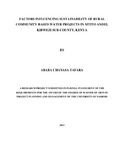| dc.description.abstract | In developing countries national and regional governments, local and international NGOs and other concerned organizations invest large sums every year for the implementation of rural water supply projects. However, construction of water projects does not help if they fail after a short time. In order to make the investment in water supplies more effective, failure rates of these systems should be reduced. The main objective of the study was to establish the underlying factors influencing sustainability of community based water projects so as to make an appropriate recommendation for enhancing sustainability of water projects especially in a rural setting of the Mtito Andei. This study employed descriptive survey. The study population constituted of the household heads. The respondents were reached through household survey and purposive identification of the subject matter or key informants across relevant local institutions. The study used a combination of both probability and non-probability sampling techniques. This study collected quantitative data using a questionnaire from the respondents. The data was analyzed using descriptive statistics generated from statistical tools (SPSS V.17.0 and Excel). From the findings, the study concluded that the level of stakeholders’ participation in the water projects was low which affected the sustainability of water project. The stakeholders’ participation was critical in the implementation of the water projects. Stakeholders were involved in the water project through contribution of funds/other resources, through designing and in management. The stakeholders’ participation positively enhanced the sustainability of the rural community based water projects to a great extent. The has transformed health, sanitation practices in the region, facilitated participation of local communities in development initiatives in the region, encouraged residents to take ownerships of their own community resources, improved security in the region by reducing conflicts over natural sources of water, encouraged residents to conserve available water resources and other natural resources, as well as helped the community gained substantial knowledge and technical skills from the water project. It has also united people from different cultures/tribes/clans in the region, builds community identity and pride and helped to uphold cultural norms as well as promoted social networks amongst residents in the region. The water project has enhanced partnerships between the local community and the government or non-governmental organizations. There is insufficient technical expertise to manage the project, and human resource for sustainability of the project. The level of adoption of technology in the management of water project was very low impairing the sustainability of water projects. Technology was a critical factor affecting the sustainability of the community based water project through reduction of operations costs, improving the efficiency of the project and increasing the longevity of the projects. The adoption of the technology in the water project was minimal. The study recommends that the level of stakeholders’ participation in the project planning and implementation should be increased to enhance the sustainability of the water projects in the county. The project management should seek to adopt modern technology through increased budgetary allocations. The government should institute stringent measures to deal with persons vandalizing the community water project. This should be coupled with improved security offered by the security agencies to mitigate the cases of vandalism. The water projects should be managed more competently. | en |

